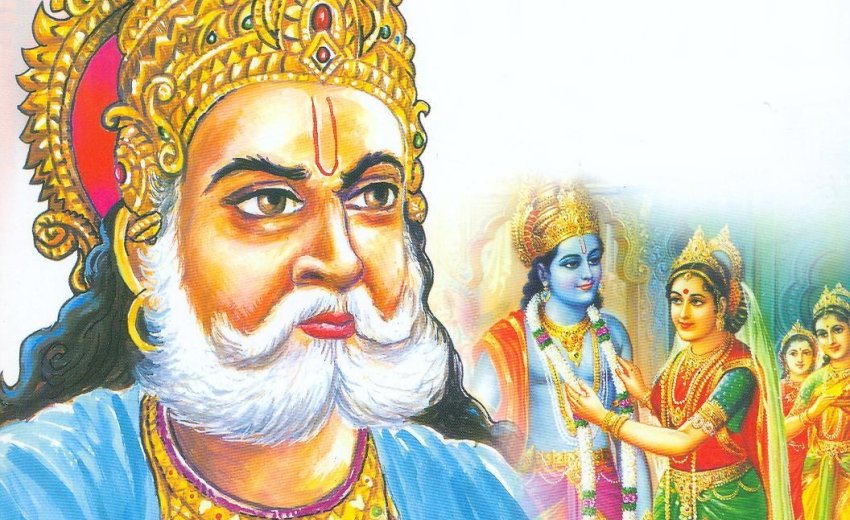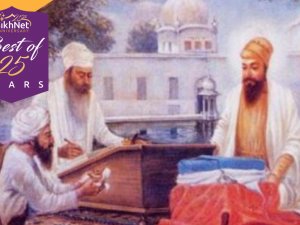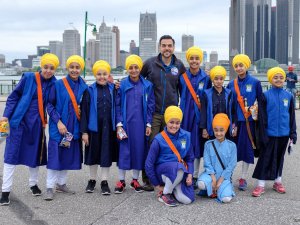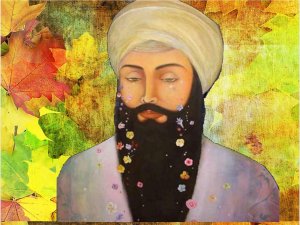Introduction to the short stories
#####
The short stories are a collection of stories taken from the Aad Guru Granth Bhagat Mala, which have been translated into simple English. The purpose of translating these stories is to provide understanding and the significance of these stories when reciting Gurbaani.
The Sikh Gurus and other Bhagats within Sri Guru Granth Sahib Ji have made references to the various saints and disciples who existed at the time of the Hindu deities. By no means are these stories a form of praise or worship of the Hindu deities, but they are used as a reference to purely develop the meaning of Gurbaani.
The stories taken from Hindu mythology provide examples from the lives of the disciples and saints as parallels to understand the power and greatness of the One Lord, the righteous practise of faith and Dharma and how one is emancipated from sin and misfortune through meditating upon the Primal Lord.
~ Harjinder Singh Khalsa
The Story of Raja Janak
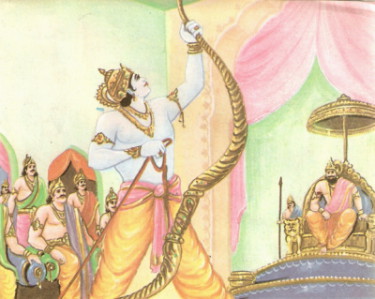
Raja Janak, known as the treasure of compassion, reigned during the time of Ram Chandar. He is equally mentioned in the Vedas and used as an example within Sri Guru Granth Sahib Ji and Bhai Gurdas Ji Vaaran to establish the greatness of meditating upon the One Primal Lord and the fruits of one's meditation.
Raja Janak was the father to Sita, the wife of Ram Chandar. He proposed a test of strength, in which suitors from all over the world came to complete for his daughter's hand in marriage. Suitors were required to string the great bow of Shiva and to shoot an arrow with so much power. Only one suitor was successful, that being Ram Chandar, who shot the arrow with so much strength that, the bow broke in half.
Raja Janak became a great devotee of Ram Chandar and became absorbed in meditation upon the Lord. At the time of his death, Raja Jank remembered the Lord. His soul was liberated and descended to heaven on a divine chariot.
Upon his journey to Dharam Raj (the righteous judge), Raja Janak passed the pit fires of hell. There he heard the cries of millions of souls, suffering and calling out to him to save them. Raja Janak felt pity and asked Dharam Raj, "Why are they suffering in this place?"
Dharam Raj replied, "They are wretched souls. They have failed to remember the Lord in meditation and have committed countless sins. Now they are made to suffer the pangs of hell due to their past actions. Whatever you sow, you shall reap and this is their punishment."
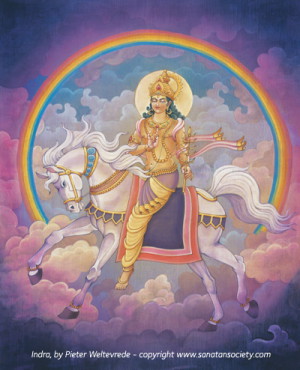 Raja Janak could not see the plight of suffering before his eyes and begged Dharam Raj to release them and to end their misery. Dharam Raj said he did not have the authority to do this. However he advised Raja Jank that the only way in which these souls could be saved is if someone could offer part of their devotion and meditation to their account. Only then these souls can be liberated.
Raja Janak could not see the plight of suffering before his eyes and begged Dharam Raj to release them and to end their misery. Dharam Raj said he did not have the authority to do this. However he advised Raja Jank that the only way in which these souls could be saved is if someone could offer part of their devotion and meditation to their account. Only then these souls can be liberated.
On hearing this, Raja Janak said, "Then so be it. I will offer a part of my devotion and remembrance of the Eternal Lord to free these souls."
Dharam Raj accepted this. Merits from Raja Janak's meditation were added to the accounts of all the souls trapped in hell. They were released by the greatness of Raja Janak's merits and attained divine bodies.
The gateway to heaven was opened to Raja Janak. There, all the deities descended and sang the praises of Raja Janak. Conch shells were blown, drums were beaten, and flowers were showered upon the Raja.
Raja Janak liberated and saved the honour of millions of souls trapped in a realm of misery with the power invested in the Lord's Name from his meditation.
Below is the story of Raja Janak as written by Bhai Gurdas Ji. Vaar 10, Pauri 5:
੫ : ਰਾਜਾ ਜਨਕ
ਭਗਤੁ ਵਡਾ ਰਾਜਾ ਜਨਕੁ ਹੈ ਗੁਰਮੁਖਿ ਮਾਇਆ ਵਿਚਿ ਉਦਾਸੀ।
Bhagatu Vadaa Raajaa Janaku Hai Guramoukhi Maaiaa Vichi Udaasee.
भगतु वडा राजा जनकु है गुरमुखि माइआ विचि उदासी ।
King Janak was a great saint who amidst maya remained indifferent to it.
ਦੇਵ ਲੋਕ ਨੋ ਚਲਿਆ ਗਣ ਗੰਧਰਬ ਸਭਾ ਸੁਖਵਾਸੀ।
Dayv Lok No Chaliaa Gan Gandharaboo Sabhaa Soukhavaasee.
देव लोक नो चलिआ गण गंधरबू सभा सुखवासी ।
Along with gans and gandharvs (calestial musicians) he went to the abode of the gods.
ਜਮਪੁਰਿ ਗਇਆ ਪੁਕਾਰ ਸੁਣਿ ਵਿਲਲਾਵਨਿ ਜੀਅ ਨਰਕ ਨਿਵਾਸੀ।
Jamapuri Gaiaa Poukaar Souni Vilalaavini Jeea Narak Nivaasee.
जमपुरि गइआ पुकार सुणि विललाविनि जीअ नरक निवासी ।
From there, he, hearing the cries of inhabitants of hell, went to them.
ਧਰਮਰਾਇ ਨੋ ਆਖਿਓਨੁ ਸਭਨਾਂ ਦੀ ਕਰਿ ਬੰਦ ਖਲਾਸੀ।
Dharam Raai No Aakhiaonu Sabhanaa Dee Kari Band Khalaasee.
धरम राइ नो आखिओनु सभना दी करि बंद खलासी ।
He asked the god of death, Dharamrai, to relieve all their suffering.
ਕਰੇ ਬੇਨਤੀ ਧਰਮਰਾਇ ਹਉ ਸੇਵਕ ਠਾਕੁਰੁ ਅਬਿਨਾਸੀ।
Karay Baynatee Dharamaraai Hau Sayvaku Tdaakuru Abinaasee.
करे बेनती धरमराइ हउ सेवकु ठाकुरु अबिनासी ।
Hearing this, the god of death told him he was a mere servant of the eternal Lord (and without His orders he could not liberate them).
ਗਹਿਣੇ ਧਰਿਅਨੁ ਏਕ ਨਾਉ ਪਾਪਾ ਨਾਲਿ ਕਰੈ ਨਿਰਜਾਸੀ।
Gahinay Dhariaonu Iku Naau Paapaa Naali Karai Nirajaasee.
गहिणे धरिओनु इकु नाउ पापा नालि करै निरजासी ।
Janak offered a part of his devotion and remembrance of the name of the Lord.
ਪਾਸੰਗਿ ਪਾਪੁ ਨ ਪੁਜਨੀ ਗੁਰਮੁਖਿ ਨਾਉ ਅਤੁਲ ਨ ਤੁਲਾਸੀ।
Paasangi Paapu N Pujanee Guramoukhi Naau Atul N Tulaasee.
पासंगि पापु न पुजनी गुरमुखि नाउ अतुल न तुलासी ।
All the sins of hell were found not equal even to the counterweight of balance.
ਨਰਕਹੁੰ ਛੁਟੇ ਜੀਅ ਜੰਤ ਕਟੀ ਗਲਹੁੰ ਸਿਲਕ ਜਮ ਫਾਸੀ।
Narakahu Chhoutay Jeea Jant Katee Galahoun Silak Jam Dhaasee.
नरकहु छुटे जीअ जंत कटी गलहुं सिलक जम फासी ।
In fact no balance can weigh the fruits of recitation and remembrance of the Lords name by the gurmukh.
ਮੁਕਤਿ ਜੁਗਤਿ ਨਾਵੈ ਦੀ ਦਾਸੀ ॥੫॥
Moukati Jougati Naavai Dee Daasee ॥5॥
मुकति जुगति नावै दी दासी ॥५॥
All the creatures got liberated from hell and the noose of death was cut. Liberation and the technique of attaining it are the servants of the name of the Lord.
Authors who mention Raja Janak in Sri Guru Granth Sahib Ji:
Guru Raam Das Ji, Ang 995, 1309
Bhatt Kal, Ang 1389, 1390, 1398, 1407
Bhatt Kal Sahaar, Ang 1391
---------------------------------------------------------------------------
Related Articles:
Part II: Bhagat Angra ji and Bhagat Bidar
Part III: Sri Dhru Bhagat & Sri Prahladh Bhagat ji
Part V: The Story of Bhagat Sudama
Part VI: The story of Gotam Muni & Ahalia
Part VII: The Story of Raja Janak
Part VIII: The Story of Raja Bali
Part IX: The Story of Ajraja-Akrur
Part X:The Story of Bhisham Pitaama
Part XI: The Story of Chandar Hans
Part XII: The stories of Durbaasha Rishi and Gajinder (the Elephant)
Part XIII:The Stories of Kubija Maalan and Oudhar
Part XIV:The Story of Sarvan Bhagat
Part XV: The Story of Rishi Balmeek
Part XVI: The Stories of Sankaadik and Rukmaangudh
Part XVII: The Story of Sukdev Muni
Part XVIII: Madhusudan Demon Destroyer
Part XXI: Sulhi & Sulbi Khan's Evil Conspiracy
Part XXII: The Story Raja Hari Chand
